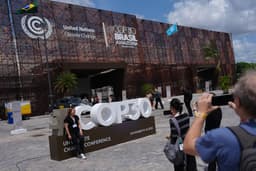Home / Environment / Brazil's Superfood Revolution: Exotic Fruits Poised to Conquer Global Markets
Brazil's Superfood Revolution: Exotic Fruits Poised to Conquer Global Markets
16 Nov, 2025
Summary
- Machines in Belém, Brazil pulping "superfood" fruits like cupuaçu, taperebá, and bacaba
- These fruits are rich in antioxidants, fiber, and fatty acids, similar to açai berries
- Brazil aims to introduce these superfoods to global markets like the UK, Europe, and US

As of November 16th, 2025, a lab in Belém, Brazil is working to process a variety of exotic "superfood" fruits that could soon be appearing on social media feeds and in trendy cafes around the world. Fruits like cupuaçu, taperebá, and bacaba, which are similar to the popular açai berry, are being pulped and transformed into powders and other products.
These Amazonian fruits are rich in antioxidants, fiber, and fatty acids, making them attractive candidates to become the next global superfood sensation. Brazil, which is hosting the COP30 UN climate talks, sees this as part of a bold plan to tackle climate change, protect the country's natural resources, and create economic opportunities in the face of regional poverty.
"There's a lot of superfoods in the forest that people don't know," says Max Petrucci, founder of a local company Mahta that sells powdered cacao and brazil nuts. The drink he provides has a gritty, chocolate-like taste without any added sugar.
Brazil is hoping to capitalize on the growing global demand for nutrient-dense, sustainably-sourced superfoods by introducing these lesser-known Amazonian fruits to markets in the UK, Europe, and the United States.



